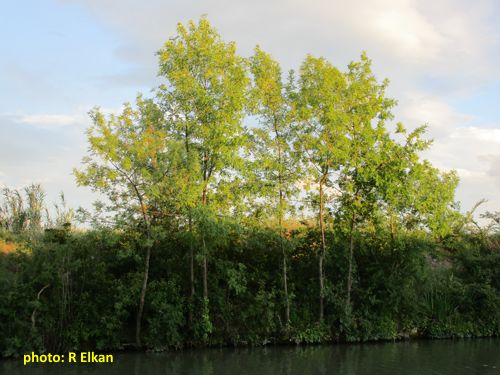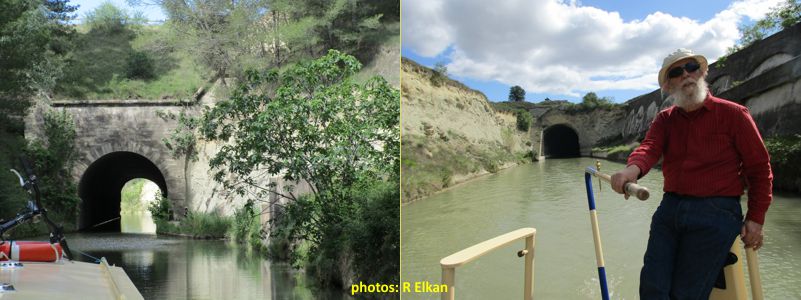| itinerary < 29 May Canal du Midi 31 May > | Canal du Midi 30 May 2016 |
|
We had stars last night for the first night in awhile ... and later, a 3rd quarter moon making a path on the Canal out our bedroom window. Rochelle caught a picture of first light on the young trees, new-planted by the VNF (The Canal Authority) to replace the Plane trees that have fallen victim to a disease. One sees the magnificent old trees still standing, their leaves stained red from the disease, with Xs spray painted on them: soon to be cut down. It will be years before Riquet's stately rows, planted to control erosion of the banks, rise again to their full glory. But, as you've seen, many beauties remain apparently untouched. After our coissant and pain de maïs (cornbread) breakfast, we walked into the nearby town, Colombiers, seeking the post office. |
 |
 |
What a pit! The Colombiers silly fathers went whole hog for the canal trade, and what they have is a forlorn festival of absent Euro trash. What a despirited little town. One of our guidebooks said it was "pretty and welcoming" but at 9:45 on a Monday morning, it seemed that everybody was dead. At least half the boats – tubs; there really weren't any boats – look abandoned, mothballed. |
Fiberglass RomanceIn their infinitesimal wisdom, Colombier's town fathers made the docking fee very inexpensive ...so this is where you park the plastic skow you keep for "pleasure cruising" the Canal on alternate weekends ...if you don't have something better to do. By trying to beat the competition – you can park your boat anywhere along the Canal outside town limits for free for as long as you like (from April through October; the VNF drains and maintains the Canal during the winter months) – the town fathers created an attractive nuisance, and now I imagine they don't know what to do to get their sweet little town back. Clearly, a lot of Europeans abuse this welcome; the nationality of the boats runs from British and Dutch to Spanish and Greek. About a third of the boats look like they haven't been driven for a month or more, judging by the leaves and moss. One out of thirty is resting on the bottom. The French are proud to be a permissive culture, meaning mostly that there's very little enforcement. By and large, that works out well for everyone: living in a nanny state is tiresome. With regard to food, the EU has imposed regulation, but not much enforcement, and has completely taken over, with Germanic efficiency, the money. Convenient for us, but I'm still not entirely convinced it's a good thing for the nations. (With Maria Montessori, I'm also not sure that nations are a good thing. Bigger isn't better, and so the EU seems to me like it's going in the wrong direction. Definitely grist for the mill...) |
|
Poor little Colombiers is the poster child for what's gone wrong, and we got ourselves outta town. |
|
Back on the water, I was in love again. The pace, the scenery (excepting Colombiers), the light through the Plane trees, the poufy little clouds riding jauntily across the blue sky. Even the steady gargling of our little diesel engine delights me. What I love most is carving gentle, appropriate curves with my 48 foot boat as the Canal contours around hills, over creeks, into little dells.
Just outside Colombiers we revisited the challenge of the Malpas Tunnel. It's a blind approach from either side – you can't see if there's someone coming until you're committed ... but we were lucky both times. This time, on the way in a class of French children headed to the Canal museum stopped to wave, and at the tunnel mouth a party of French photographers busily filmed our passage. Our narrow little boat is just what people want to see on the Canal. Pop Quiz: What does the top symbol mean? (Answer below.) We saw no spiders in the tunnel. |
 |
 |
 |
We boated a long time today, 5½ hours, with a stop for a wander through Capestang, a much sweeter village, for another good lunch. We walked the town for a half hour looking for a different restaurant, but on Monday, French restaurants in the countryside are closed. On Saturday and Sunday, they're full. If you want to eat, come to rural France Tuesday through Friday. Finally, we went back to the Bateliere on the Canal, where we'd had a very adequate lunch. I had trout amandine, a favorite, and Rochelle had Salade Niçoise. Afterwards, a Grand Marnier crêpe. We went back to the boat ready to mix it up with the other fortified boat drivers. Here we are, tied up outside Argeliers, all set for their Tuesday morning market. |
|
(Added the next morning:) More grist for discussion: rereading this, and thinking about it overnight, I'm puzzled by the negative tone. If travel is so annoying, why do it? I can think of several justifications (if not answers.) The first, and probably the most interesting, is that we came here because it sounded like fun ...and it is. Even so, there are moments, like mooring or trying to find lunch on Monday, that are annoying ...but life outside the cocoon of home (and sometimes even there!) is annoying. (Let me have an Amen.) Since socially and politically we all seem to find ways to shoot ourselves in the foot (we collectively only have the one foot), what's interesting about travel is how others in apparently similar but actually profoundly different cultures manage, by trying to do good things, to screw up. Like the Italians, the French are very regimented (and differ!) in their notions of what constitutes a proper meal, and when meals should be eaten: here, 1 o'clock (or 13 as they say) and 19:30 or later, and it should be a cocktail, an entrée, a plat (main course), a dessert (which may be cheese), and a coffee. As a result, eating is very ceremonial, predictable, takes a long time, puts a lot of emphasis on quality. Compare this with our American fast food culture and what do you conclude? If you only want a couple of those courses, your server is rightfully concerned for your well-being. Because the French are an accommodating people (at least the ones in the service industry), he or she will enable you to depart from the time-proven known-to-be-healthy norm, thereby risking certain ill health, and can't help disapproving. This regimentation carries over to things like restaurant closures always being Monday. Why wouldn't half of them close Tuesday instead? That, dear reader, is an American thought. What can we learn from it? How about, What equally illogical things do we do in our lives that leads us or others who rely on us to annoyance? |
|
Bringing me to my second possible justification: perspective. Embedding ourselves thoroughly and comfortably in our own little worlds, we lose the ability to see what that world looks like from outside. Wednesday is always market; the milk lives in the refrigerator door on the left; the cat likes to sit on my lap in the morning. This routine leads inexorably to inflexibility, and I think we can agree that inflexibility is the enemy of long life (assuming that's a goal.) Travel busts us out of that comfortable little world. Our friend Charles recommends lying down on the floor every so often (he demonstrated this in the foyer of the Mendocino Hotel) so that you can practice getting yourself up again: it's something we seldom need to do, but it is unarguably a critical skill, getting ourselves up after we have fallen. Deliberately jarring ourselves out of our ruts is a survival practice that helps us be ready when we are jarred out by outrageous fortune. |
|
Here's a third: appreciation. Other cultures manage stresses and annoyances we all experience even in the comforts of our home terrain. Finding the perfect parking spot, or even just a convenient one, is an order or two of magnitude (10 or 100 times) more difficult in the narrow convoluted streets of a Séte or a Narbonne than it is in Fort Bragg, or when your vehicle is 48 feet long and the good parking places are occupied by Euro-trash scows. On this score at least, something about the way we late-developing Californians have formed our lives is working better. We can see that the parking problem in France is a species of the parking problem in, for example, San Francisco. Fort Bragg's workable solution is not simply wider streets and more parking (although that's certainly a part of it); it is also related to history and economics (France arranged its parking a century at least before cars) and regulation, and reveals working solutions arrived at by the French (smaller cars) that would make parking easier in San Francisco (were SUVs to be excluded.) |
|
And a fourth: tolerance of diversity. Diversity isn't necessarily comfortable (take mosquitoes ...please!) but it puts right in our faces the need to handle adversity with as much grace as possible. By seeking to limit or eliminate adversity from our home lives, we allow the tolerance muscles to atrophy ... yet, as noted above, exercising them is probably a healthy thing to do. All four of these justifications are inter-related, obviously: tolerating, even seeking, diversity fosters flexibility and perspective and often as not leads to appreciation. So I'm cutting myself a little slack in the negative attitude dimension and, on this midpoint in our 2016 trip, vowing to work on my patience and tolerance. (One more thing: The black dot in the middle of the red square means "Klaxonnez" -- sound your horn. The symbol below it means "narrow.") |
 |
updated 16 June 2023 Caspar Time site software and photographs by the Caspar Institute except as noted this site generated with 100% recycled electrons! send website feedback to the CI webster © copyright 2002-2024 Caspar Institute |